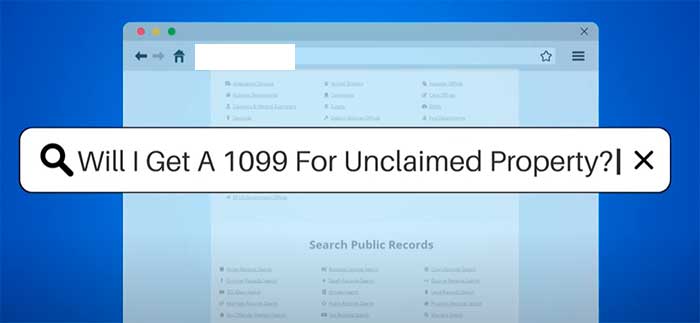
Understanding the 1099 Form
A 1099 form is an information return used to report various types of income other than wages, salaries, and tips. Common types of 1099 forms include:
- 1099-INT: Reports interest income from bank accounts, bonds, and other investments.
- 1099-DIV: Reports dividend income from stocks and mutual funds.
- 1099-B: Reports proceeds from broker and barter exchange transactions.
- 1099-MISC: Reports miscellaneous income, including rental income, prizes, and awards.
These forms are used to inform both the taxpayer and the IRS about income that might be subject to taxation.
Will You Receive a 1099 for Unclaimed Property?
No, you will not receive a 1099 for unclaimed property itself. The IRS considers it a return of previously taxed income. However, if the unclaimed property generates interest after being reclaimed, you may receive a 1099-INT form for the interest earned.
Here’s a breakdown of scenarios where a 1099 might be issued:
- Interest Income: If the unclaimed property includes bank accounts or other financial instruments that have earned interest, you may receive a 1099-INT form.
- Dividend Income: For unclaimed stocks or mutual funds that have generated dividends, a 1099-DIV form might be issued.
- Sale of Securities: If you sell reclaimed stocks or bonds, you may receive a 1099-B form for the sale proceeds.
- Other Income: For miscellaneous types of income, such as refunds or other unclaimed cash, you might receive a 1099-MISC.
To avoid potential 1099s for interest earned after reclaiming property, it’s best to claim your property as soon as possible. For more detailed information on the tax implications of unclaimed property, read our article Is Unclaimed Property Taxable? | Tax Implications Explained.
How to Handle the 1099 Form for Unclaimed Property
If you receive a 1099 form for unclaimed property, here’s how you should handle it:
- Review the Form: Check the details on the 1099 form to ensure they are accurate. This includes the income amount and your personal information.
- Report the Income: Include the income reported on the 1099 form in your federal tax return. This is crucial for ensuring you pay any taxes owed on the reclaimed property.
- Keep Records: Maintain a copy of the 1099 form and any documentation related to the unclaimed property for your records.
- Consult a Tax Professional: If you have questions about how to report the income or handle any discrepancies, consult a tax professional for guidance.
Common Types of Unclaimed Property and Their Tax Forms
Here’s a quick guide to common types of unclaimed property and the corresponding 1099 forms you might receive:
| Type of Unclaimed Property | Possible 1099 Form |
|---|---|
| Bank Accounts (with interest) | 1099-INT |
| Stocks and Mutual Funds (with dividends) | 1099-DIV |
| Sold Securities | 1099-B |
| Miscellaneous Cash Payments | 1099-MISC |
Always verify with the issuing entity to confirm which forms you will receive.
Why You Might Not Receive a 1099 Form
There are scenarios where you might not receive a 1099 form for unclaimed property:
- No Reportable Income: If the unclaimed property does not generate reportable income, you may not receive a 1099 form.
- Below Reporting Threshold: If the income generated from the unclaimed property is below the IRS reporting threshold, a 1099 form may not be issued.
- Non-Financial Assets: Physical items or property that do not generate income (e.g., jewelry, art) typically do not result in a 1099 form.
Consulting a Tax Professional
Given the complexities of tax reporting, especially with unclaimed property, it’s advisable to consult a tax professional. They can provide specific advice on how to handle 1099 forms, report income, and ensure compliance with tax laws.
Conclusion
Receiving a 1099 form for unclaimed property depends on whether the asset generates reportable income after being reclaimed. The IRS considers unclaimed property itself as a return of previously taxed income, so it does not issue a 1099 form for the property itself. However, if the property earns interest or dividends, you may receive a corresponding 1099 form.
To avoid complications, claim your property promptly and consult with a tax professional for personalized advice on handling tax forms and reporting income. For more detailed information on the tax implications of unclaimed property, visit our article Is Unclaimed Property Taxable? | Tax Implications Explained.
